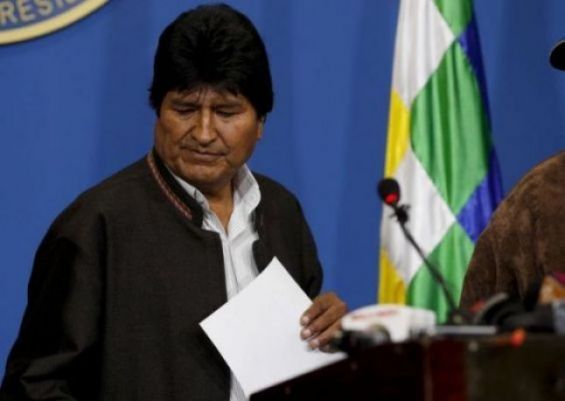On Sunday, Bolivian politician Evo Morales announced on national TV that he is resigning from his post as president, following a wave of protests.
For three weeks, Bolivians took to the streets to protest against the fourth term of Morales. The protests in Bolivia were supported by the police and army, Reuters and AFP reported. Evo Morales denounced the «illegal» arrest warrant issued against him, and the attack carried by «violent groups» against his home.
The change in Bolivia, with the United States’ blessing, is similar to the situation in Venezuela. The day after his reelection, Nicolas Maduro has also been the subject of a wave of protests aiming to oust him. A movement led by opposition leader and president of the Venezuelan parliament Juan Gaido, who has proclaimed himself acting president, received the support of the United States and several countries, including Morocco.
Polisario loses an ally
With this departure of Evo Morales, Morocco and the Polisario Front are probably eyeing the situation in Bolivia. And for good reason, as Bolivia is one of the last Latin American countries supporting the Polisario and recognizing «SADR». In the end of October, the secretary general of the separatist movement was one of the first people to express his congratulations to the Bolivian president following his re-election.
With Uruguay and Uganda, Bolivia was one of the only countries to defend the Polisario theses at the meeting of the Fourth Committee of the UN General Assembly earlier in October. La Paz even defended «the self-determination of the people of Western Sahara».
Moreover, in July, when Morocco confirmed its breakthrough in Latin America, with the announcement of the withdrawal of the recognition of «SADR» by El Salvador and Barbados, the movement of Brahim Ghali consolidated its achievements by appointing a new «ambassador» in Bolivia, in the person of Mohamed Salem Daha Lehbib.
During his presidency of the Security Council in October 2018, Bolivia made sure to put Western Sahara at the top of its agenda and abstained in the vote on the resolution on the mandate of MINURSO.
However, the waiting for a return to calm in Bolivia and the arrival of a successor for Evo Morales is not the same in Rabat and Tindouf. If the Polisario, which loses an important ally on this continent, hopes that the next Bolivian president maintains diplomatic ties with Front, this is a golden opportunity for Morocco to tip a country that recognized the «SADR» in 1982.
A withdrawal of recognition or even a neutrality of La Paz on the dispute will confirm the breakthrough of the Kingdom’s diplomatic efforts in Latin America. It remains yet to be seen whether Rabat will go so far as to abandon its cautious stance, would express a position on the situation in Bolivia and play an active role, as was the case for Venezuela.





 chargement...
chargement...













